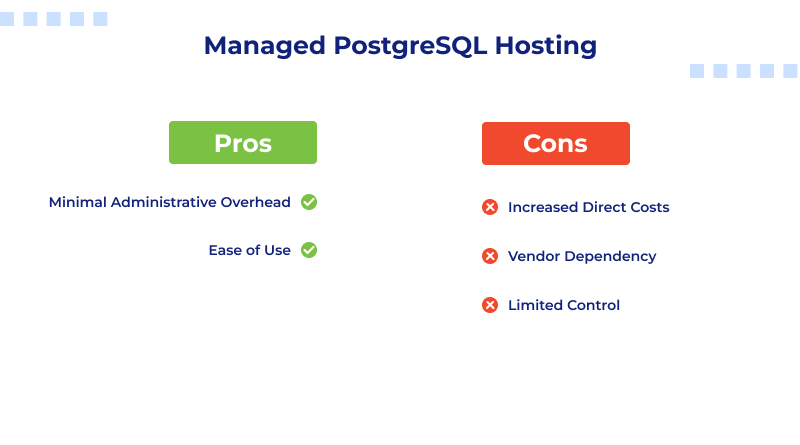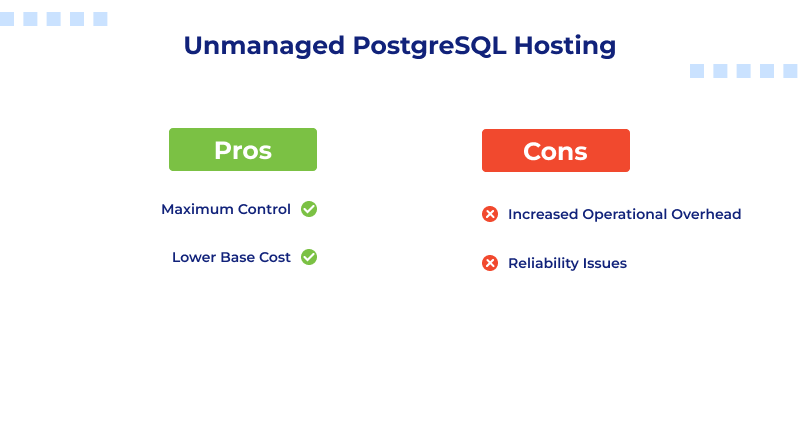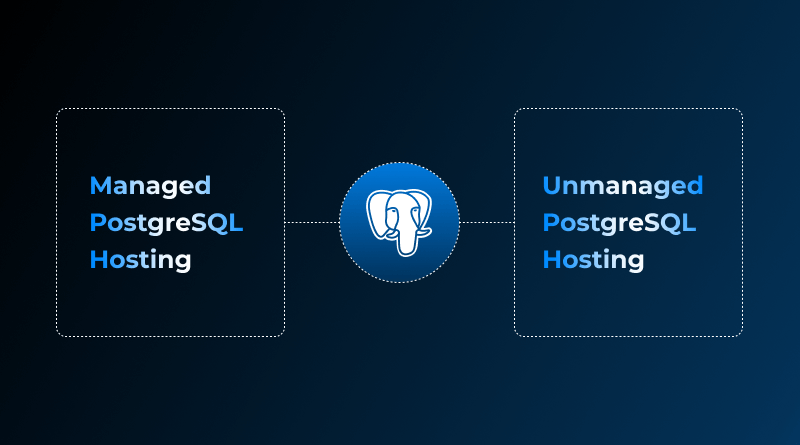Up to 30% of DevOps time is spent on maintenance rather than innovation.
Now think about it: genius engineers are hired to create, to crack difficult issues, and to get our product out. Instead, they have to spend 30% of their lives making backups and tweaking configurations.
Each week, our engineers invest significant time in patching servers, backing up databases, and adjusting configurations. It’s necessary work, but what if that time could be used for building new features, improving user experiences, or speeding up deployment cycles? This is the key issue that leads us to the conversation about managed vs. unmanaged PostgreSQL hosting.
Ultimately, the main factor for our team is deciding between how much control and accountability we want to keep versus how much ease and hands-off service we want from a provider.
Here in this insightful blog, we will analyze the technical and business trade-offs of each of the two models in this case. Given the variables of cost and control, as well as the variables of scalability and security, we will examine which of the two possible models best suits the team’s skill sets, budget, and expected growth, enabling us to make the best possible decision for the PostgreSQL infrastructure well into the future.
Table Of Content
What is PostgreSQL Hosting?
PostgreSQL is an open-source, Object-Relational Database System (ORDBMS) that is feature-rich, emphasizing SQL compliance and extensibility. It is known for its tried-and-tested architecture, data consistency, and robustness, as well as its capacity to process complex, high-volume workloads.
Providers like MilesWeb, AWS, and Azure are fully responsible for the managed PostgreSQL hosting work as Database-as-a-Service (DBaaS) providers. They take care of server maintenance, OS patching, automated backups, and even high availability and scaling, relieving our team of those responsibilities and allowing us to focus only on the data, schemas, and application performance.
Unmanaged PostgreSQL hosting, on the other hand, provides full ownership and is hosted on a VPS server or dedicated server, complete with the potential for OS-level tweaks and PostgreSQL configurations at every tier. Complete freedom of design, however, means that every aspect of patching, securing, monitoring, and maintaining uptime will be on our shoulders.
Defining Managed PostgreSQL Hosting
There are no longer burdens of legs and server systems, as the provider tends to all the complexities of setup and upkeep, along with the optimizations. Instead, the teams in charge of an app can concentrate on scaling and app-building, as the Postgres system is offered as a service for host clients.
With managed hosting, the provider bears the weight of the operational setup, inclusive of the following:
- Automated backups and Point-in-Time Recovery (PITR) functionality: There is a guarantee that the data may be restored to any given instant, which proves to be useful towards the protection of data against any accidental loss or corruption.
- Automated patching, updates, and security gaps: Your PostgreSQL environment is kept secure and compliant while you focus on other aspects of your business.
- Monitoring and alerting: Your systems deliver health insights in real-time and automate recovery to minimize downtime during failure.

Pros of Managed PostgreSQL Hosting
- Minimal Administrative Overhead: Engineering hours are made available for other important tasks like innovation and application development.
- Ease of Use: Most managed systems integrate easy-to-use dashboards or APIs for configuring, monitoring performance, and scaling resources without any downtime.
Cons of Managed PostgreSQL Hosting
- Increased Direct Costs: Increased monthly costs compared to unmanaged host setups due to the inclusion of management services alongside infrastructure.
- Vendor Dependency: Managed service providers often lock customers in by making migrations hard due to proprietary setups and cloud services.
- Limited Control: There may be restrictions on advanced PostgreSQL config options, and managed services may limit access to a full OS.
Defining Unmanaged PostgreSQL Hosting
With unmanaged PostgreSQL hosting, you control the entire database server environment. You provision the server and configure, maintain, and protect every layer of the stack. You control everything, even the Operating System, which means you control every update, every patch, and every optimization. With this approach, you have the most control and flexibility, but it will require the most work and technical knowledge, which you have indicated is in your workload.
Your workload will include:
- Patching the OS and security hardening as new vulnerabilities are discovered in the system.
- Installing, configuring, and performance tuning PostgreSQL. For example, editing parameters in postgresql.conf.
- Designing backup and recovery strategies to control for data integrity.
- Building high availability (HA) systems and defining the failover procedures to lower the downtime during system failures.

Pros of Unmanaged PostgreSQL Hosting
- Maximum Control: You get maximum leverage on the system. Full root access means that you can customize to the finest detail, tweak the performance to your needs, and customize the PostgreSQL extensions or plugins you want to use.
- Lower Base Cost: You get value for your money. You are paying for the raw infrastructure, for example, a VPS or dedicated server, and you are avoiding the costs of service providers and third-party managers.
Cons of Unmanaged PostgreSQL Hosting
- Increased Operational Overhead: The time and money spent on product development will be offset by the amount of time that will be required to manage all the components and hire a skilled DBA or DevOps team.
- Reliability Issues: Your system will solely depend on your internal maintenance schedule and your monitoring, troubleshooting, and maintenance capabilities.
Managed Vs Unmanaged PostgreSQL Hosting: Head-to-Head Comparison
In the end, selecting managed versus unmanaged PostgreSQL hosting revolves around the control and effort you and your team are willing to allocate to the database operations. Below, there are practical differences outlined in a side-by-side comparison.
| Feature | Managed PostgreSQL Hosting | Unmanaged PostgreSQL Hosting |
| Responsibility | The provider (DBaaS) manages everything — infrastructure, patching, backups, and scaling. | The internal team or DBA handles setup, maintenance, tuning, and security manually. |
| Technical Expertise | Minimal — ideal for teams focusing on SQL and app logic rather than system admin tasks. | High — requires advanced knowledge of Linux systems, PostgreSQL configuration, and networking. |
| Total Cost | Higher direct cost, but predictable monthly pricing that includes maintenance and support. | Lower server cost, but hidden labor costs from internal DBA time and risk of downtime. |
| Scaling | Simple and automated — achieved through a dashboard or API with minimal downtime. | Manual configuration — requires setting up replicas or resizing resources manually. |
| Customization | Limited OS access and restricted deep-level tuning, depending on the provider. | Full root access for maximum customization, plugin support, and configuration freedom. |
The decision to go with managed or unmanaged PostgreSQL hosting boils down to control vs. cost vs. convenience. Unmanaged hosting has lower initial costs and offers flexibility but will require a lot of time and expertise to set up and operate. Managed hosting will come at a higher, consistent cost but has a lot of automation and offers reliability and peace of mind.
Select Managed if you want developer output and need guaranteed uptime (SLA); you also need a database management team.
Select Unmanaged if your team consists of skilled DBAs or DevOps engineers, needs unique setups, and has tight budgets.
FAQs
1. How much technical knowledge is needed for unmanaged hosting?
Unmanaged hosting entails a lot of work. You would need high levels of Linux system administration and PostgreSQL skills. You will need to install, configure, monitor, scale, and secure PostgreSQL. Unmanaged hosting is ideal for teams with DBAs or DevOps engineers.
2. What are the typical costs associated with each?
Managed hosting has high upfront costs due to management fees, but it is predictable. Unmanaged hosting is cheaper on infrastructure, but due to the maintenance and staffing needed, it can become expensive.
3. Is it possible to transition between managed and unmanaged hosting in the future?
Sure. Moving to another type of hosting is possible, although it will entail some downtime and moving storage, as well as some adjustments to the setup. It helps to choose providers that offer migration tools to make the process smoother.
4. Which is easier to scale, managed or unmanaged hosting?
With managed services, scaling is easier as providers have one-click controls for vertical and horizontal changes. In unmanaged services, it is more complex and time-consuming, as scaling requires manual adjustments and tuning.














